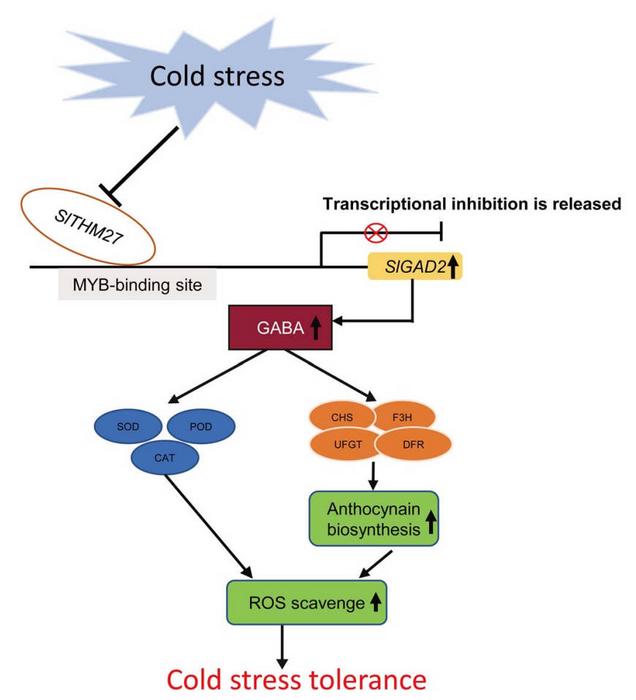China
July 8, 2024

A working model for SlTHM27-SlGAD2 in response to cold stress. - Credit: Horticulture Research
In a significant advancement for agricultural biotechnology, researchers have identified a genetic mechanism that enhances the cold tolerance of tomatoes. This breakthrough is pivotal for cultivating crops in cooler climates, ensuring stable yields and bolstering global food security. The study focuses on the SlGAD2 gene, which, when overexpressed, elevates the plant's γ-aminobutyric acid (GABA) levels, boosts antioxidant activities, and stimulates anthocyanin production, collectively improving cold resilience.
Tomatoes play a vital role in global agriculture but are susceptible to cold stress, which dramatically reduces yield and quality. Understanding the genetic underpinnings of cold tolerance is crucial for developing robust tomato varieties. The research hones in on the SlGAD2 gene, a crucial element in the plant’s defense system against cold, offering potential strategies for breeding tomatoes capable of thriving in colder environments.
A recent study (DOI: 10.1093/hr/uhae096) by Northwest A&F University, published in Horticulture Research in April 2024, investigates the SlGAD2 gene's role in enhancing tomato cold tolerance. Genetic modifications enabled researchers to increase the synthesis of γ-aminobutyric acid (GABA), significantly boosting the plant's resistance to cold stress. This study not only illuminates the genetic factors underlying cold tolerance but also proposes a viable approach to enhance tomato production under adverse climatic conditions.
The research demonstrates that SlGAD2 gene overexpression significantly elevates GABA levels, which correlates with strengthened cellular defenses and reduced damage from cold exposure. Detailed investigations reveal that SlGAD2-overexpressing tomato plants display increased activities of antioxidant enzymes and enhanced reactive oxygen species scavenging capabilities—key factors in mitigating oxidative stress under cold conditions. Additionally, this genetic modification leads to increased production of anthocyanins, known for their environmental stress protection. These results suggest that SlGAD2 is a promising target for developing cold-resistant tomato varieties.
Dr. Tianlai Li, co-author of the study, states, "This genetic advancement opens up new possibilities for bioengineering tomato plants to prosper in cooler temperatures, potentially broadening their agricultural range and enhancing food security in climate-sensitive areas."
The findings hold significant implications for agricultural biotechnology, providing a genetic toolkit to improve crop resilience against cold stress. The development of new tomato varieties capable of growing in colder regions could extend the growing season, enhance farm productivity, and increase economic returns for growers, making this a crucial step forward in agricultural science.
References
Article title: SlGAD2 is the target of SlTHM27, positively regulates cold tolerance by mediating anthocyanin biosynthesis in tomato
Publication date: 1 June 2024
DOI: 10.1093/hr/uhae096
Original Source URL: https://doi.org/10.1093/hr/uhae096
Funding information
This work was supported by Scientific and Technological Innovative Research Team of Shaanxi Province (2021TD-34), China Agriculture Research System (CARS-23-D06), and the National College Student Innovation and Entrepreneurship Training Program (202210712083 and X202310712703).
About Horticulture Research
Horticulture Research is an open access journal of Nanjing Agricultural University and ranked number one in the Horticulture category of the Journal Citation Reports ™ from Clarivate, 2022. The journal is committed to publishing original research articles, reviews, perspectives, comments, correspondence articles and letters to the editor related to all major horticultural plants and disciplines, including biotechnology, breeding, cellular and molecular biology, evolution, genetics, inter-species interactions, physiology, and the origination and domestication of crops.